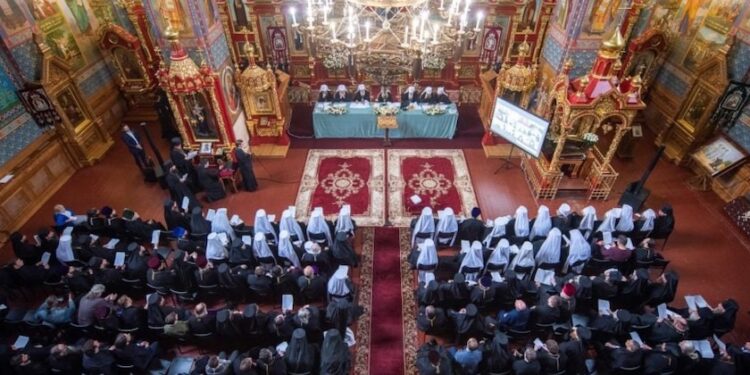By Efi Efthimiou
A significant development in the relationship between the Ukrainian Orthodox Church (UOC) and the Moscow Patriarchate unfolded on Thursday afternoon.
Specifically, several Bishops of the UOC expressed strong opposition to decisions made last week by the Synod of the Russian Orthodox Church concerning UOC dioceses located in Russian-occupied territories.
On October 24, the Russian Church’s Synod resolved to dismiss Metropolitan Hilarion of Donetsk and Mariupol from his position overseeing this UOC Metropolis.
Previously, the Russian Synod had similarly removed UOC Metropolitans from other occupied regions in Ukraine. According to orthodoxtimes.com, numerous Bishops of the UOC—reportedly led by Metropolitan Agathangelos of Odessa—condemned these actions through social media posts. They highlighted that these measures “were taken unilaterally, without any prior consultation with the Ukrainian Orthodox Church, which has been canonically independent since the Tomos issued by Patriarch Alexy on October 27, 1990, and reaffirmed by the Holy Synod of the UOC on May 27, 2022.”
In a joint statement posted on their personal social media accounts, the UOC Bishops declared: “We, the Bishops of the Ukrainian Orthodox Church, vehemently condemn this decision as uncanonical, as ecclesiastical law governs the proper relationships between Orthodox Churches.”
The statement continues: “The Second Canon of the Second Ecumenical Council underscores the necessity of respecting jurisdictional boundaries and warns against any attempt by one Church to seize control of another territory.
The Eighth Canon of the Third Ecumenical Council explicitly prohibits any Bishop from intervening in the jurisdiction of another. Furthermore, this decision aims to undermine Ukraine’s independence and jeopardize the very existence of the Ukrainian Orthodox Church, especially under the dire circumstances of ongoing military conflict on Ukrainian soil.”
The Bishops’ statement further emphasizes: “The uncanonical removal of Metropolitan Hilarion of Donetsk, who is of Ukrainian origin, and the appointment of a Russian Bishop in his place, reveal Moscow’s intent to annex the canonical territory of the Ukrainian Orthodox Church, threatening its autonomy and independence.”
Finally, the UOC Bishops conclude: “We do not accept this decision and demand its immediate revocation. We call for an end to aggressive ecclesiastical policies against the Ukrainian Orthodox Church and its suffering flock, as well as respect for the UOC’s jurisdictional boundaries, Ukraine’s sovereignty, and territorial integrity.”
The statement ends with the Bishops’ signatures, notably excluding that of Metropolitan Onufriy.
Translated by Ioanna Georgakopoulou



